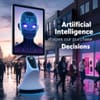Artificial intelligence (AI) is quietly revolutionizing the way consumers make purchasing decisions. Every online action—from the products we view to the time we linger on certain items—is tracked and analyzed by AI systems that predict what we might buy next. The article explains that this process transforms traditional shopping into an AI-driven journey, where algorithms curate options based on behavior, preferences, and demographics. Over time, this influence becomes so seamless that consumers may not realize how much AI is guiding their choices rather than merely assisting them.
The rise of personalization has made AI a crucial force in modern marketing. By narrowing vast catalogs into a few tailored suggestions, AI simplifies the buying process and saves time for users. For instance, instead of browsing hundreds of similar gadgets, shoppers are presented with a refined list that aligns with their past interests. However, the article warns that while this makes purchasing more convenient, it can also subtly reduce consumer autonomy—shaping not only what people buy, but also how they think about their needs and desires.
Trust and transparency emerge as central themes in the discussion. Consumers appreciate personalized recommendations but often remain unaware of the reasoning behind them. The article highlights that when AI suggestions are driven more by profit motives than genuine user interest, trust begins to erode. Understanding why an item is being recommended—whether it’s truly relevant or just a promotional push—is critical to maintaining credibility in AI-assisted marketing.
In conclusion, the piece emphasizes the ethical responsibility of brands and developers in deploying AI. While predictive analytics and personalized algorithms can enhance user experience, they should not manipulate decisions or limit consumer choice. Businesses must prioritize fairness, transparency, and respect for individual autonomy. As AI continues to evolve, the future of shopping will depend not only on smarter technology but also on the integrity of how that technology influences human decision-making.


